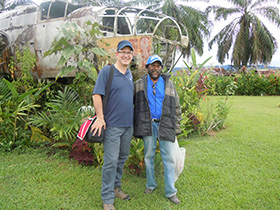Papua New Guinean and Australian research team to capture PNG wartime experience along Kokoda Track
Media releaseResearchers from Deakin University and Papua New Guinea are teaming up to collect first-hand accounts of the experiences of Papua New Guineans along the Kokoda Track during World War II.
The project, which is funded by the Australian Government under the Kokoda Initiative, will draw on the expertise of leading Papua New Guinean historian, Professor John Waiko, the director of PNG's National Museum and Art Gallery Dr Andrew Moutu, and representatives from the Kokoda Track Authority, the PNG Tourism Promotion Authority, and the PNG and Australian Governments.
"So much has been written about Kokoda from the Australian perspective, yet very little has been recorded from the Papuan New Guinea perspective," explained the project's lead researcher Dr Jonathan Ritchie.
Australian Minister for the Environment, Greg Hunt, said he was delighted the Australian Government is able to support such an important historical project through the Kokoda Initiative.
"The Kokoda Track is an iconic battleground of the Second World War; it is a place that saw some of the bloodiest fighting of the war and is forever etched into the Australian memory," he said.
"Wracked by disease, fatigue and jungle infections, the wounded Australian soldiers relied heavily on support from the local communities.
"Today the Kokoda Track symbolises the lasting bond of friendship and mutual understanding between the people of Papua New Guinea and Australia."
Mr Hunt said the Kokoda Initiative is delivered in partnership by the governments of Papua New Guinea and Australia and aims to work towards the sustainable development of the Owen Stanley Ranges and the Kokoda Track Region.
"The ongoing commitment shown by the governments of Papua New Guinea and Australia will ensure that the initiative continues to work towards achieving improved trekking experiences for those visiting the Track, build closer ties between the two nations and improve the quality of life for people living along the Track."
Dr Ritchie said he was particularly excited about Professor Waiko's involvement.
"John is from a part of Papua New Guinea close to the Kokoda end of the track, and has written extensively on the Papua New Guinean experience of the war," explained Dr Ritchie.
"He was consultant, interviewer and narrator of the 1982 film Angels of War, about the famous 'fuzzy wuzzy angels'.
Dr Ritchie said a team of Papua New Guinean researchers from the areas spanned by the Kokoda Track – the Koiari and Orokaiva peoples – would also be helping to collect the interviews.
"This aspect of the project is particularly exciting," he said.
"We are bringing together young Papua New Guinean men and women who will learn the craft of historical research and oral history and be part of this wonderful national project to record for future generations the experiences of their elders."
Professor Waiko said the history of Kokoda was not just important from a Papua New Guinean perspective.
"This is our heritage, but it is also world heritage," he said.
"It is a very exciting project."
Professor Waiko said it was important that the memories of the people's experiences along the track from 1942 to the end of the war were recorded.
Professor Waiko said many people were familiar with the tales of the 'Fuzzy Wuzzy' soldiers who helped the allies during the war.
"I interviewed one of those warriors - Raphael Oimbari, who spoke of his experiences helping the Australian soldier Mr Whittington, to the aid station after he had been wounded," he said.
"He shared his biscuits as he walked the wounded soldier back, only to cry when the soldier later died."
Professor Waiko said there would be stories of how Papua New Guineans felt as they saw the Japanese ships arrive, the bombs dropping and the guns firing.
"There would also be stories of how people questioned their loyalties," he said.
"People in the Northern Province were loyal to the Australians and when they withdrew, people questioned whether they would remain loyal to the Australians or whether they would support the Japanese.
"Memories of the deaths are particularly vivid, people cried, particularly the mothers, when the able bodied young men were recruited to take part in the war to be carriers."
Further information:
Listen: to Dr Ritchie talk about the project on ABC Radio's Pacific Beat
Video: Dr Ritchie and Professor Waiko are interviewed about the project.
Share this story
 Dr Ritchie and Professor Waiko in front of wartime relic at Girua airport, Oro Province
Dr Ritchie and Professor Waiko in front of wartime relic at Girua airport, Oro Province
